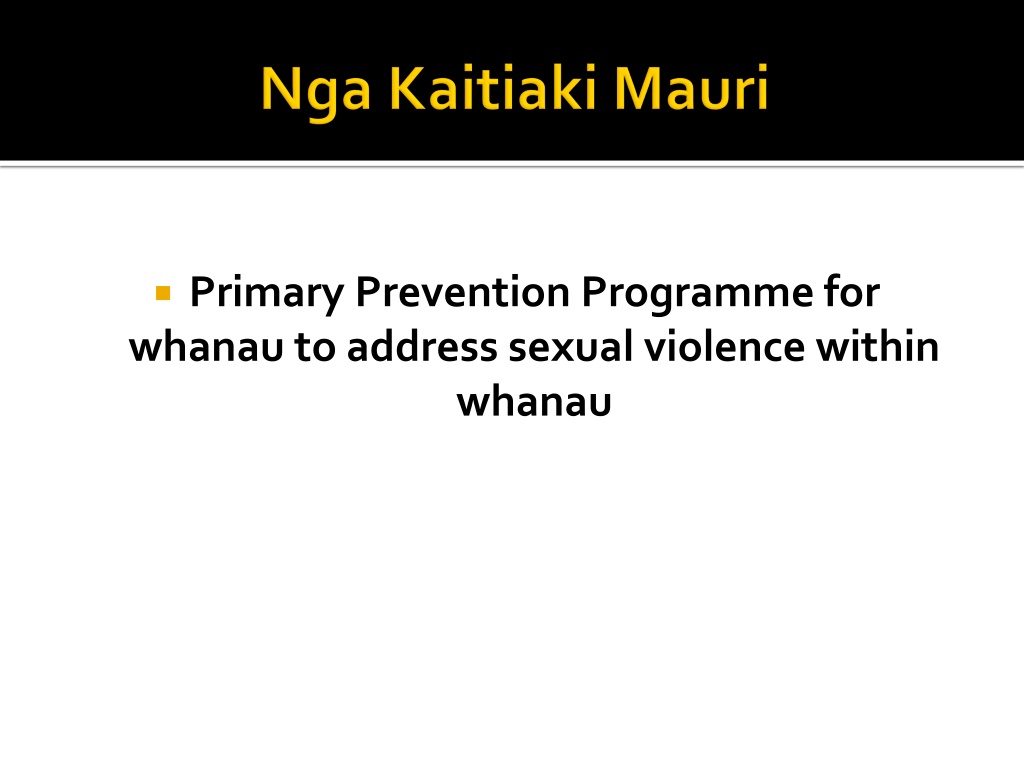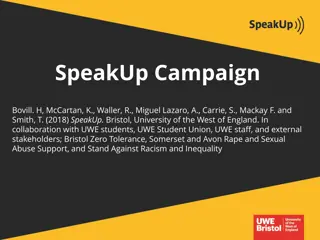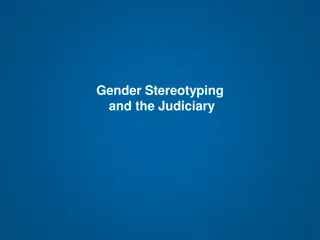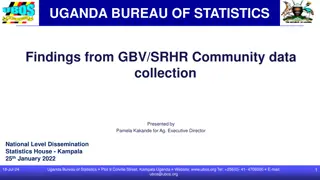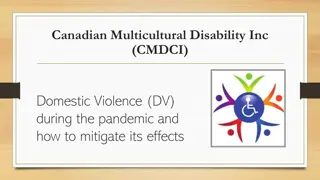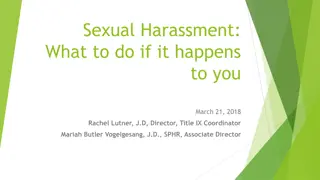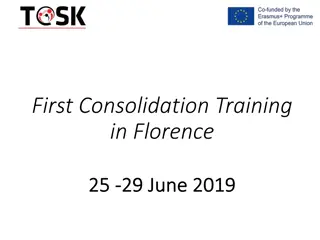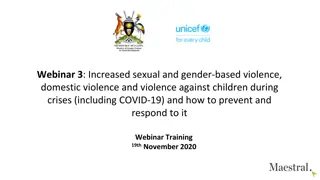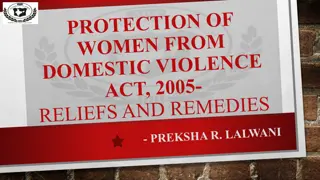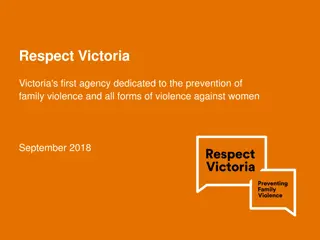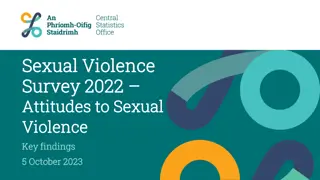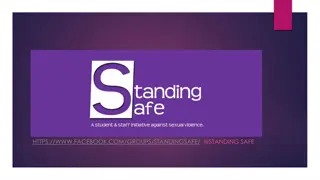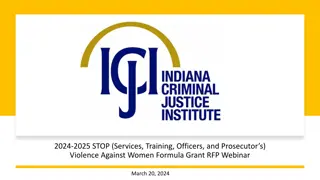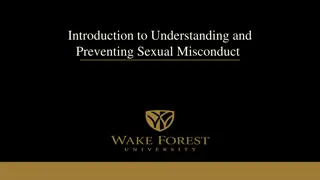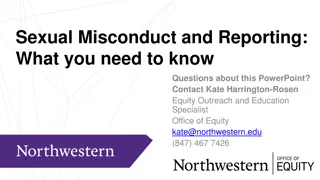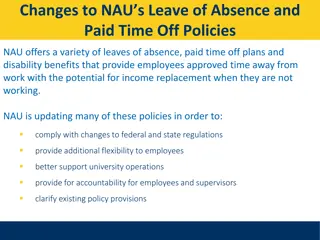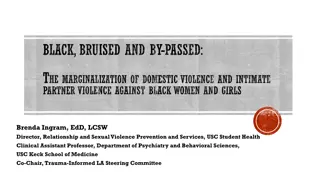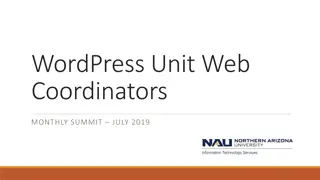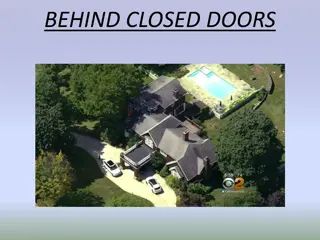Understanding and Addressing Sexual Violence Within Whānau
Whānau-based programmes are crucial for preventing and addressing sexual violence within Māori communities. The Transforming Whānau Violence Taskforce emphasizes the significance of upholding Māori values and tikanga to combat violence. Definitions of sexual abuse and violence, including intimate partner violence, highlight the importance of cultural values and the impact on individuals and their whānau. Violation of Te Whare Tapu o te Tangata can lead to distress affecting Māori women and their families on physical, psychological, and spiritual levels.
Download Presentation

Please find below an Image/Link to download the presentation.
The content on the website is provided AS IS for your information and personal use only. It may not be sold, licensed, or shared on other websites without obtaining consent from the author. Download presentation by click this link. If you encounter any issues during the download, it is possible that the publisher has removed the file from their server.
E N D
Presentation Transcript
Primary Prevention Programme for whanau to address sexual violence within whanau
Primary Prevention Programme Whanau Ora Pathway Programme Mauri Ora training programme
The Transforming Whnau Violence Taskforce understands wh nau violence as the compromise of Te Ao M ori values. Wh nau violence can be understood as an absence or a disturbance in tikanga. Tikanga is defined by this Taskforce as the process of practising M ori values. The Taskforce believes that transgressing whakapapa is a violent act and that M ori have a right to protect (rather than defend) their whakapapa from violence and abuse. (p.10) Kruger, T., Pitman, M., Grennell, D., McDonald, T., Mariu, D., Pomare, A.,(2004).p. 10
(A)Mori definition of sexual abuse based on cultural values is defined as the trampling of a person s mana or personal power and identity by others sexual comments or behaviours. This definition is ground in the M ori value of relationships, which M ori view as important and sacred engagements. Ng Kaitiaki Mauri National Stocktake of Kaupapa and Tikanga M ori services (2009), p. 19.
Sexual Violence is Rape, forcing someone to have sex, sexual harassment, unwanted sexual touching, forcing someone to watch pornography, forcing a person to become pregnant, not using contraception, and not allowing wahine to take contraception, forced abortion or not letting the person have an abortion Te Pu waitanga o Te K kano, p. 16
Adding to those definitions is Intimate Partner Violence also involves children witnessing violence in wh nau in some form Intimate Partner Violence involves a range of behaviours directed towards a partner in the form of coercion, threats, intimidation, emotional, mental abuse, using strategies of isolating their partner, minimising, denying, blaming, manipulation, harassing, stalking, forced marriage, marital rape, male privilege and economic abuse. Hoeata et al (2011), p.2
Any violation of Te Whare Tapu o te Tangata (that is the house of the people), such as abuse of the genital area and rape, has the potential to create distress amongst M ori women and their whanau This distress is not only physical or psychological in origin, but also spiritual and has multiple dimensions to it. Not only is this a violation of the woman herself, but also a violation of her tipuna and her future generations. Spiritual distress is often a dimension that is neither recognised nor acknowledged, but one that hinders recovery and healing. Wilson, D. (N/D) Family Violence Intervention Guidelines: M ori and Family Violence On behalf of M ori Advisory Committee, Ministry of Health, Family Violence Project, School of Health Studies, Wellington: Massey University, p. 5.
As stated in Transforming Violence report by the M ori Taskforce on Wh nau Violence they created a conceptual framework that assumes the impacts of colonisation as central to the normalisation of violence in wh nau. (Mauri Ora). They go on to say that the results from the destruction and distortion of whanau violence is on whakapapa tikanga, wairua, tapu, mauri and mana, is one consequence of colonisation. Kruger, T., Pitman, M., Grennell, D., McDonald, T., Mariu, D., Pomare, A.,(2004).p.7
Transforming Whnau Violence taskforce discusses the issues of legitimacy when referring to raupatu and theft, this can be similarly applied to the intentional harm against another people, in terms of the deliberate colonising strategies employed by the settler government. Kruger, T., Pitman, M., Grennell, D., McDonald, T., Mariu, D., Pomare, A.,(2004).p.13
Whakapapa describes the relationships between Te A Kikokiko (the physical world) Te A wairua (the spiritual world). The reciprocity and obligatory nature of whakapapa means that it can be used to create productive and enduring relationships to support change. Whakapapa establishes and maintains connections and relationships and brings responsibility, reciprocity and obligation to those relationships. Kruger, T., Pitman, M., Grennell, D., McDonald, T., Mariu, D., Pomare, A.,(2004). P. 18 Ibid: p. 18
Violence is a global phenomenon. Violence has a sequence of events, starting with an intentionto commit violence on another person, then actedupon, creating an impact on individuals, wh nau, hap and ultimately their communities. New Zealand s definition of violence, places less importance on the notion of intentionality, and rather more on the harm caused. Doolan, (2004). Violence in Society. P.1. Doolan, (2004) cites Ritchie & Ritchie (2002), p. 8.
The focus of primary prevention of sexual violence and all other forms of violence needs to be placed on the intention of sexual violence and other forms of violence, as opposed to the end result of harm that sexual violence has. This is a responsibility for everyone to intervene in the intention .
Moana Jackson (1988) states in pre-European times, M ori had clear processes that defined ways of interacting and provided norms of control. He notes a complex set of customs and lore existed that provided the mechanism for regulating behaviour. These were both preventative and intervention mechanisms and provided systems of social control and resolution processes. Te Puawaitanga o te K kano, p. 99
Essentially, an investment in culturally relevant monitoring and evaluation of all government programmes created and delivered to M ori is fundamental to all programmes being delivered. Such investments are critical for M ori to maintain their own processes retaining the cultural imperatives for health, wellbeing, based on the complex set of customs and lore that Jackson discusses. Te Puawaitanga o te K kano, p. 99
What is required to move forward is for people, groups and government to acknowledge and commit to the involvement of tangata whenua in developing and delivering solutions by M ori for M ori. Tangata whenua structures of leadership require engagement that is inclusive of wh nau, hap and iwi particularly where there is a need to respond to sexual violence within a M ori community. Ibid:p. 73
Ng Kaitiaki Mauri has identified their goal of creating and developing a Primary Prevention Programme of sexual violence within wh nau, utilising the Wh nau Ora programme, whose outcomes are: Wh nau are self-managing Wh nau are living healthy lifestyles Wh nau are cohesive, resilient and nurturing Wh nau are participating fully in society Wh nau are confidently participating in Te Ao M ori Wh nau are economically secure and successful The wh nau approach is central to long term wellbeing. Our strength and power comes from wh nau wh nau is the key to eliminating violence. (E Tu hui participant).
An essential element of Whnau Ora is to build on the existing skills while realising the skill base in wh nau to manage all situations. Building the capacity in wh nau, hap and iwi as a priority, offers effective prevention, responsibility, while restoring respect, trust, effecting wh nau ora..
Primary prevention of the intention of any form of violence within whanau and community is everyone s responsibility. Whanau having regular whanau hui can be the start for all whanau to take responsibility for all whanau members and encourage mana enhancing practices of respect and dignity for each other.
